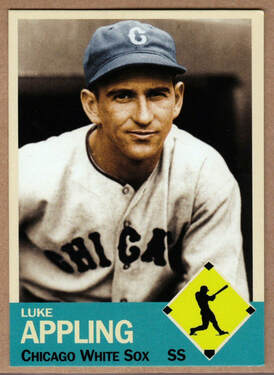Lucius Benjamin "Luke" Appling
Cecil Travis of the Washington Senators: The War-Torn Career of an All-Star Shortstop " - Robert J. Kirkpatrick and Dave Kindred
Travis recounted 60 years later." Elberfeld, an ex-major leaguer, was president of Tubby Walton's Baseball University in Atlanta. The school was named after William Hewlett "Tubby" Walton. Tubby Walton was a large, jovial man known amongst Atlanta sandlots for his good nature. He once ran a cafe named "Tubby's Home-Cooked Meals, which he had to shut down when he realized he was giving away more meals through the back door of the cafe than he was selling to paying customers. Walton was what was known then as a "bird dog," or freelance scout. He developed young players at his "university" and then shopped their rights to professional teams. He also ran a touring team, Tubby Walton's Firecrackers, which gave his students a chance to refine their playing skills. Once, Walton had informed Elberfeld that he'd discovered "a little boy that can hit a curve ball."
"Ain't no boy can hit a curve ball, Bird," Elberfeld replied.
"This boy kin. Look a little like a Indian and kin hit a curve ball."
Elberfeld told him to bring the player to the school, which in truth consisted of a "skin diamond and a chicken-wire backstop" in Almand Park. Elberfeld later remembered: "I got this pitcher who was sorta mean. Later got in jail. I tole him to knock this Indian down and then curve him. This mean boy low-bridged him, then that Indian-looking boy hit the next curve 10 miles." The "Indian-looking boy" was named Luke Appling. Elberfeld accepted Appling to the school, and later he got Appling signed to a pro contract for the Atlanta Crackers of the South Association. Appling would go on to a Hall of Fame career as a shortstop in the Majors. Walton also had the distinction of discovering Johnny Mize, the future Hall of Famer slugger. When he first saw Mize playing in the North Georgia hills, Walton claimed that Mize "flogged a line drive that hit a hickory tree 500 feet from home, so hard hickor' nuts kept falling for five minutes."'
Wikipedia Summary: Lucius Benjamin "Luke" Appling (April 2, 1907 – January 3, 1991), nicknamed "Old Aches and Pains" was an American shortstop in Major League Baseball who played his entire career for the Chicago White Sox (1930–1950). He was elected to the Baseball Hall of Fame in 1964.
Born in North Carolina, Appling briefly attended Oglethorpe College. He was signed by the minor league Atlanta Crackers in 1930 and debuted with the Chicago White Sox later that year. He interrupted his career to serve in World War II in 1944 and 1945. He played for Chicago until 1950, then was a minor league manager and major league coach for many years. He served one stint as an interim major league manager in 1967. He died in Georgia in 1991.
Travis recounted 60 years later." Elberfeld, an ex-major leaguer, was president of Tubby Walton's Baseball University in Atlanta. The school was named after William Hewlett "Tubby" Walton. Tubby Walton was a large, jovial man known amongst Atlanta sandlots for his good nature. He once ran a cafe named "Tubby's Home-Cooked Meals, which he had to shut down when he realized he was giving away more meals through the back door of the cafe than he was selling to paying customers. Walton was what was known then as a "bird dog," or freelance scout. He developed young players at his "university" and then shopped their rights to professional teams. He also ran a touring team, Tubby Walton's Firecrackers, which gave his students a chance to refine their playing skills. Once, Walton had informed Elberfeld that he'd discovered "a little boy that can hit a curve ball."
"Ain't no boy can hit a curve ball, Bird," Elberfeld replied.
"This boy kin. Look a little like a Indian and kin hit a curve ball."
Elberfeld told him to bring the player to the school, which in truth consisted of a "skin diamond and a chicken-wire backstop" in Almand Park. Elberfeld later remembered: "I got this pitcher who was sorta mean. Later got in jail. I tole him to knock this Indian down and then curve him. This mean boy low-bridged him, then that Indian-looking boy hit the next curve 10 miles." The "Indian-looking boy" was named Luke Appling. Elberfeld accepted Appling to the school, and later he got Appling signed to a pro contract for the Atlanta Crackers of the South Association. Appling would go on to a Hall of Fame career as a shortstop in the Majors. Walton also had the distinction of discovering Johnny Mize, the future Hall of Famer slugger. When he first saw Mize playing in the North Georgia hills, Walton claimed that Mize "flogged a line drive that hit a hickory tree 500 feet from home, so hard hickor' nuts kept falling for five minutes."'
Wikipedia Summary: Lucius Benjamin "Luke" Appling (April 2, 1907 – January 3, 1991), nicknamed "Old Aches and Pains" was an American shortstop in Major League Baseball who played his entire career for the Chicago White Sox (1930–1950). He was elected to the Baseball Hall of Fame in 1964.
Born in North Carolina, Appling briefly attended Oglethorpe College. He was signed by the minor league Atlanta Crackers in 1930 and debuted with the Chicago White Sox later that year. He interrupted his career to serve in World War II in 1944 and 1945. He played for Chicago until 1950, then was a minor league manager and major league coach for many years. He served one stint as an interim major league manager in 1967. He died in Georgia in 1991.




